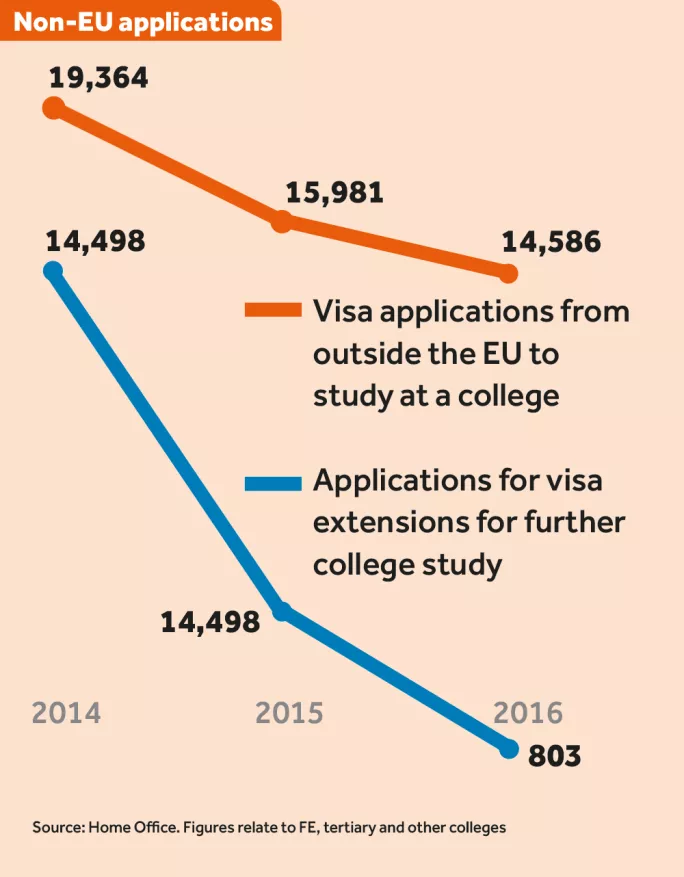‘Unfriendly’ UK immigration putting off non-EU students

Ever since Theresa May launched a crackdown on “bogus colleges” while she was home secretary, the prime minister has developed a reputation for talking - and acting - tough when it comes to international students.
Since landing the top job, Ms May has resolutely insisted that students should be included in the government’s targets to reduce net migration to “tens of thousands” - despite opposition from cabinet ministers such as Philip Hammond, Liam Fox and Boris Johnson.
Earlier this month, peers in the House of Lords backed an amendment to the Higher Education and Research Bill to take international students out of net migration targets.
Ahead of MPs having the final say on the matter next month, the latest Home Office statistics suggest that the surge in anti-immigration rhetoric related to last year’s European Union referendum has already had a significant impact on colleges’ international recruitment.
Applications plummet
The number of people from outside the EU applying for a student visa for study at a college dropped by more than 8 per cent in 2016. This trend was more pronounced in the second half of the year; applications between July and December dropped by almost a tenth from the same period in 2015.
The most dramatic decline was in the number of applications by students to extend their visas to continue college studies: this plummeted by 83 per cent, from 4,873 in 2015 to 803 in 2016.
With the international market estimated to be worth £100 million a year to the FE sector, concerns are growing about the impact of Brexit. According to Shelagh Legrave, principal of Chichester College, Tier 4 visa applications from outside the EU have dropped by 60 per cent since 2014-15. The main reason for this, she says, is the removal of the child visas that allowed FE colleges to take students at GCSE level and put them onto level 3 programmes.
“This government has focused on the risk [posed by] immigration figures rather than on the economic opportunities in selling the UK education system,” she says. “If UK education institutions, including FE colleges, are to be given the opportunity to increase their impact on their local economies, international students must be taken out of the government’s immigration targets.”
Ian Pretty, chief executive of the Collab Group of colleges, says the UK has a “world-class vocational and technical education offer” that is attractive to international students. “However, the recent tightening of restrictions in visa regulations and the vote to leave the EU has resulted in the UK being perceived as unfriendly to students from overseas,” he adds. “This is benefiting other countries, such as the US, Canada, Australia and Ireland, while UK institutions are losing a valuable source of income.”
Richard Huish College, a sixth-form college in Somerset, is looking to buck the trend and increase its international recruitment.
Liz Williams, marketing and international manager, believes that making prospective applicants feel welcome is half the battle. “Our students stay with a family here, so they really live within the community,” she explains.
The crucial decision on whether college students will be included in the overall migration targets rests with the House of Commons.
Nick Hillman, director of the Higher Education Policy Institute, has doubts about whether the Lords’ amendment will be supported by MPs.
“While I personally agree with the sentiment behind the amendment, it will be easy for the whips to show it is technically flawed, and sympathetic MPs are very unlikely to risk their future careers by supporting it,” he says.
In any case, the latest Home Office figures are “worrying”, Hillman adds. “It would have been naïve for anyone to think the noise around the referendum would make no difference to the number coming to study here in the UK.”
A Home Office spokesperson says: “We are committed to attracting the brightest and best students to the UK and there is no limit on the number of students who can come here to study.
“We have taken action to clamp down on immigration abuse in the further education sector, but we continue to have a highly competitive offer for those who wish to study in our world-class universities.”

You need a Tes subscription to read this article
Subscribe now to read this article and get other subscriber-only content:
- Unlimited access to all Tes magazine content
- Exclusive subscriber-only stories
- Award-winning email newsletters
Already a subscriber? Log in
You need a subscription to read this article
Subscribe now to read this article and get other subscriber-only content, including:
- Unlimited access to all Tes magazine content
- Exclusive subscriber-only stories
- Award-winning email newsletters